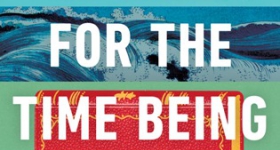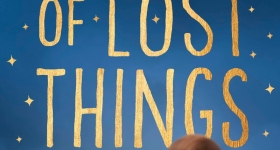The first thing you notice when you dive into "End of the Line" is how the voice of the narrator pops. Tina Bartolome, herself a native of the Bay Area, grabs us with a teenager girl's sass and surety, and from there on, she never lets us go. We see the world through the eyes of a girl on the precipice of becoming a woman, journeying with her as she rides towards a tense sexual encounter that will change her. Tina read an excerpt of this story for us, and then answered a couple of questions we had for her.
I love this story, and how it takes place entirely on one trip across a bus line. Can you talk a little bit about how this story came to you?
I grew up taking the bus. I’ve written bus poems, but I’d never written a story that takes place on MUNI. Never read one either. A friend of mine lost her virginity to a bus driver when she was a teenager, it was a bad experience and her story always stayed with me. It made me reflect on how some young women I knew growing up possessed a strong sense of their sexuality, but always got judged so hard. Then I happened to reread Audre Lorde’s essay “Uses of the Erotic: The Erotic as Power” and it blew me away (again). I saw a challenge and an opportunity to write a story about everyday life in SF that goes beyond static portrayals of men as perpetrators and women as victims.
The protagonist in this story, Renee, is an extremely strong young woman, and this aspect of her, particularly in the voice of her narration, is what really draws me to this story. How did her voice and her character come to you? Would you say you are anything like Renee?
There is an accent many of us who grew up in the city speak with that crosses racial lines. I used to take it for granted, but have come to cherish it more and more as the last of the city’s working class neighborhoods get gentrified and we are being pushed out. It’s part of how we find each other now. I wanted to get it on the page.
I grew up having friends like Renee, later on I mentored young women like Renee, and I share a fraction of Renee’s attitude. She came to life talking shit at the bus stop. I pretty much saw myself as her faithful sidekick and just tried my best not to betray her confidence.
Another important factor of this story is its location -- the Bay Area, but in particular, a bus line that skirts through neighborhoods without Renee necessarily being immersed in them. It's sort of like she's behind-the-scenes -- and when she's in the bus depot, she literally is behind the scenes. Do you think there was a particular importance to this story being set in its particular location, and in a broader sense, how do you think living in the Bay Area has affected the stories you write?
On a basic level, this is a journey story about a hook up. The 1 California is a perfect setting because the line’s route, from the high school to downtown, is the story's occasion and naturally drives all the characters forward with tension and conflict to be resolved at the end of the line.
Being born and raised in San Francisco, growing up working class, mixed race daughter of immigrants, attending public high schools, taking the bus everywhere, becoming a radical, being queer and at one point in my life writing on walls --- the sum of these identities is very Bay Area. I might still have become a radical had I grown up in some other city or country, but I was blessed to have been shaped by the legacy of activism here--home of Ethnic Studies, Poetry for the People, the I-Hotel struggle and the Black Panther Party. This political legacy shapes how I see the potential of writing, from making the invisible visible to sparking the political imagination.
The aggressive gentrification of San Francisco, and now Oakland, either obscures this history or uses it to get cool points amongst hipsters so like any displaced community, our stories and our art create a collective memory of home.
Since this is the Sex Issue, let's talk about the sexy scene towards the end of your story. How hard was it to write this scene? Did you find it difficult or uncomfortable to do, particularly considering the scene is between a teenage girl and a much older man?
I don’t write erotica, but I like writing sex scenes. They require being really present with the writing because they are inherently based in the senses and at least in the sex scenes I’ve written so far, describe step-by-step action. The first chunk of Renee and Rodney’s hook up is mutually consensual so it was easier to write but when the dynamic shifts, the challenge was to balance Renee’s internal voice, her external actions, Rodney’s moves and the bigger picture climax of the story itself.
Rodney is wrong, that’s a given. The sex scene created space for Renee’s desire, her power and her uncertainty in a way that hopefully complicates what is often portrayed in a very formulaic, predictable way.
What are your thoughts on the ground Asian American literature has covered so far, and where do you see it headed from here? What do you hope to accomplish as a Filipino American fiction writer?
I’m no expert, but Asian American literature has covered a lot of ground and most definitely themes of identity, family and migration to the U.S. Many Asian American writers get U.S. imperialism and the big historical forces that have shaped our people’s various and shared destinies, which in turn shape the stories we write and how and where our characters long, fail, change and survive.
As a Filipino American writer, I aspire to write stories that hold the complexity of many things being true at once and are not afraid to take sides. If I write a story that shows how imperialism has shaped the lives of my characters, it is in part because I want to make a case against it rather than reinforce that this is just the way things are. Why go through all that trouble only to side with the interests of the ruling class? I want to mess with hegemony, make the invisible visible, pay homage to movements and ancestors, expand definitions of family and what is Filipino American, reveal beauty in the mundane, contribute to the collective memory of my disappearing city and put good use to all this longing in my bones.
What are you reading right now and who are some of your biggest literary influences?
I recently finished and loved “Monstress” by Lysley Tenorio and “Bonesheperds” by Patrick Rosal. I just picked up the new “Manila Noir” anthology edited by Jessica Hagedorn. I can’t wait to read “Quiet as They Come” by Angie Chau.
A partial list of big influences include: “Trespassing Innocence” by Virginia Cerenio, “Dogeaters” and “Danger & Beauty” by Jessica Hagedorn, “Drinking Coffee Elsewhere” by ZZ Packer, “Drown” by Junot Diaz, “This Bridge Called My Back” anthology edited by Gloria Andzaldua and Cherrie Moraga, “Mass” by F. Sionil Jose, “Another Country” by James Baldwin, "Homegirls & Handgrenades" by Sonia Sanchez, “The Immigrant Artist at Work” by Edwidge Danticat, “God’s Bits of Wood” by Sembene Ousmane, “Memory of Fire” by Eduardo Galeano, “The Lone Ranger & Tonto Fistfight in Heaven” by Sherman Alexie, “Middlesex” by Jeffrey Eugenides, “Stone Butch Blues” by Leslie Feinberg and “Fortress of Solitude” by Jonathan Lethem.










Comments